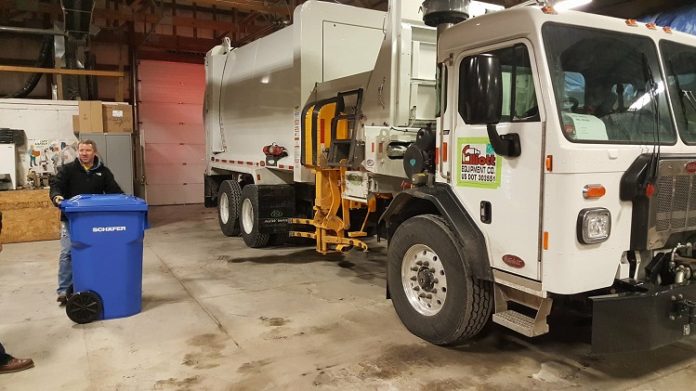
The Perry City Council made its first movements Friday morning in the direction of a major overhaul of the city’s methods for picking up garbage and recyclables.
On the garbage side, Perry residents would return to using trash cans, but they would be plastic bins on wheels and would be emptied weekly using a new one-person garbage truck with an automated side-loading arm.
On the recycling side, curbside collection would end under the new arrangements, and residents would instead haul their recyclables to one of several roll-off dumpsters placed around town, a system already used by residents in the unincorporated areas of Dallas County.
The recommended changes were among a wide range of options proposed to the council by Perry City Administrator Sven Peterson, Perry Public Works Director Jack Butler and Perry Public Works Assistant Director Josh Wuebker during a special work session on garbage and recycling.
Peterson said the session was intended to lay out the proposals and give the council a chance “to really talk about all aspects of what that would entail. There’s some good things, some challenges and everything in between” when it comes to a service that generates about $825,000 in annual revenues for the city of Perry.
Perry residents currently pay $19 a month for weekly garbage collection, a fee that also includes recycling pickup and seasonal yard waste pickup.
“We’re trying to come up with a better plan,” Butler said, “and I guess there’s no better time than the present to discuss it and see what everybody thinks and try to get moving forward.”
Butler said the automated arm trucks now commonly seen in most cities are safer for workers and require less labor. One automated truck can empty about 150 bins an hour, he said, so the city’s residential garbage collection schedule would be cut from four days a week to three, the number of city staff working the garbage route would be reduced from five persons to two and the number of trucks hauling residential trash would drop from two to one.
“The automated truck is a one-man operation,” Butler said. “Then with the other truck, instead of them being out picking up residential, they would be all on dumpsters, so you need two guys for that truck.”
As Butler explained, the process of collecting commercial garbage and commercial cardboard would also shift if the city buys the automated side-loading truck. Along with the automated truck, Friday’s proposals included the purchase of a new commercial garbage truck with cart tippers and a winch able to handle dumpsters of up to eight cubic yards in volume. The city’s current standard garbage trucks now pick up dumpsters of 1.5 cubic yards maximum.
“With the new truck having that winch on the back, we’d be able to offer larger dumpsters,” Peterson said. “I know some of the fast food places and the schools, they actually have up to four or five garbage dumpsters that get dumped almost every day, so with this new truck we might even do some sort of buy-back program where we would buy back their existing dumpsters, and they would get a new eight-yard dumpster, and maybe we’d only have go and pick that up, like, every other day.”
Given the limited space in downtown alleyways, businesses in the historical and cultural district would likely continue using 1.5-yard dumpsters, he said.
The automated garbage truck would cost about $245,000, and the truck with cart tippers and winch about $158,000. The cost for the rolling garbage bins, one for each of Perry’s 2,500 households, is $152,000. The trade-in value for three of the city’s current garbage trucks is about $162,000, leaving a total startup cost of about $400,000 for the new system.
Questions and comments abounded from council members about the proposals, particularly concerning the new rolling bins and the routine for emptying them. To help answer the questions, Peterson, Butler and Wuebker were joined by Corey Schultz, a sales representative from the Grimes office of Elliott Equipment Co., which sells the New Way trucks out of Scranton.
Schultz described the features of the automated garbage truck and the new rolling bins and answered the council’s technical questions. Three sizes of bins are available, he said, 35 gallon, 65 gallon and 95 gallon. The city department heads recommended using the 95-gallon bins.
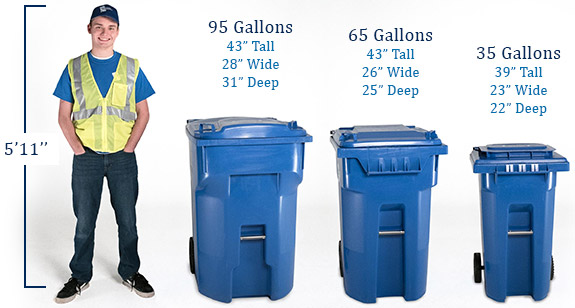 Under the proposed changes, the city would buy the rolling bins or carts and assign one to each address.
Under the proposed changes, the city would buy the rolling bins or carts and assign one to each address.
“So we would have a database of every single cart that we have and the address that it should be at,” Peterson said, “so if a cart is stolen or something like that, we have a way to be able to track that cart.”
The automated side-loading garbage truck has one arm on the passenger side of the vehicle, so the most efficient way to collect residents’ refuse would be if all the bins on a street were placed on the same side of the street. Otherwise, the truck would go up one side, turn around and go down the other.
The council appeared to lean toward same-side collecting, which would entail modifying some of the city’s motor vehicle parking ordinances.
Perry Mayor John Andorf said the city of Cedar Falls recently began requiring residents to place all their receptacles on one side of the street.
“Now everybody has to take it to one side of the street in order to save time, money, gas, et cetera,” Andorf said. “I’m not saying that’s the way it should be. I’m just saying that’s how they do it.”
Council member Dean Berkland said same-side pickup “would sure save us tons of time and money. Why have two trucks go when you got one going anyway? So just have them take it to the other side of the street. That only makes good sense.”
Council member Barb Wolling also recommended a same-side system.
“Put the bins on one side of the street and make it simple,” Wolling said. “If we’re going to do this, let’s do it to start with so that we don’t have to pick up two sides of the street and then a year later we come back and put it on one side of the street.”
Wuebker noted a possible difficulty in same-side bin placement.
“One problem we came up with,” Wuebker said, “is right now in some of the parking there’s 14 inches of snow, so they would have to bring their cart over that snow and put it on the other person’s side. That’s one of the down sides.”
Council member Chuck Schott asked whether bins would be placed curbside in the street or on the grass parking beside the curb.
“It’s totally up in the air,” Butler said, emphasizing the open nature of Friday’s work session. “We can do whatever we need to do. That’s the beauty of it. It’s our beast to tame.”
Schott observed that “if it’s somebody else’s property, and you have to put it up on their grass, you’re going to have some issues there between neighbors.”
Schott also asked whether a 95-gallon bin could be managed by an elderly person, even someone who puts only one or two small bags into their bin each week.
“I think it might be surprising how many feeble elderly people we have,” he said. “For instance, my wife probably could not get any of those three carts down our steep driveway and out into the street. There’s no way in hell she could comply with the rule if something happens to me or I’m gone or out of town or whatever. And I think there’s a lot of these little old ladies and older gentlemen who are starting to get a little frailer. I think it’s a good idea. Don’t get me wrong. But I think there are some locations that would be challenging.”
Asked by Butler, Perry Finance Officer Susie Moorhead confirmed that more than 20 elderly or disabled residents currently receive special treatment by the garbage crew. If residents are physically unable to bring their refuse to the curb, the sanitation workers will fetch it from their porch or beside their garage.
“This brings up another good point for why we would want to keep our own garbage service and not farm it out,” Peterson said, referring to one of the other options brought before the council for consideration. “If we went with Metro Waste or something like that, they would come in with three trucks and in one day do the whole town, and good luck calling them for anything outside of their little square of what they do. We do a lot extra as far as customer service for our folks. That’s a lot of the reason it’s nice to live in a small town. You can call a human at city hall and talk to them and get on that sort of a list.”
Schott praised the city workers for their customized garbage collection.
“You’re not exaggerating there,” he said. “Our personnel are excellent. If they see you coming a little bit late, they’re going to wait, and they’re going to be helpful, and they’re going to have a smile on their face. That’s a great thing for a small town.”
The conversation continued for more than an hour, raising many unanswered questions and identifying many winkles remaining to be ironed out of the garbage.
On the subject of recycling, the first point made was the almost complete collapse of the market in recyclables. Wuebker said the city’s cardboard collections used to fetch $120 a ton and now gets $10 a ton. The same applies to waste paper, which used to earn the city $25 a ton but now costs the city $40 a ton to dispose of. Plastic once brought in $225 a ton and now fetches $15 a ton.
“It’s not just in Perry. It’s everywhere,” Wuebker said.
Moorhead confirmed the city used to generate about $50,000 yearly in recycling, but now “it is a loss,” she said. “We receive less in revenue for the cardboard recycling fee and for the sale of recycling product than the cost we incur for one full time employee, vehicle expense, insurance expense, et cetera.”
The second point was the recycling rate among Perry residents. Butler said a recent informal windshield survey of Perry’s 2,500 households found some 608 were recycling, which is about 25 percent.
In light of the current market, Peterson and Butler offered the council two options. The first would continue curbside pickup of recycling but begin to assess a fee for the service, as with the garbage bill. This option was forcefully opposed by Council member Dr. Randy McCaulley.
“People who recycle are really doing a benefit to the city and to the state, really, by recycling,” McCaulley said. “I think it’s wrong to charge a fee for somebody doing what I think is the responsible thing by recycling. To me, that’s punishing people for being responsible. If you’re going to charge people to recycle, why do it then?
“We’ve never actually put a fee on the garbage bill for recycling,” Peterson said, “because we used to make money on it.”
Iowa Code Section 455B.302 requires all cities and counties in the state to provide a recycling program for their residents, so there must be limits to the city’s disincentives. The second option would eliminate curbside collection and require residents to carry their recyclables to one of several large dumpsters placed around town.
“I think if you take the recycling away, there’s not going to be that many people who will take it somewhere else,” said Council member Vicki Klein. “I just don’t think there will.”
Butler said centralized collection was the surest way to control recycling costs to the city.
“Quite honestly,” he said, “if it wouldn’t have been for the grant that bought us our first truck back in the late ’80s or ’90s, we would probably have a central location right now because we are governed to provide some sort of way for our residents to recycle.”
After additional discussion, the council resolved to move forward with plans for centralized recycling collection using dumpsters and with a system of garbage collection using an automated side-loading truck, with many details yet to be worked out.
“If we do choose to move forward with this,” Peterson said, “which I really hope we do, we would plan on doing at least one open house, probably down at the Public Works shop, where we would have the cans set up with the new truck and let people jump up in there and run the arm and see how it works. There would be a lot of public outreach in that respect, really outlining the reasons why you would make the change and what it’s going to do for the community.”
Peterson also said a display with the new rolling trash bins would also be set up for public inspection at the local grocery stores so people can “see it and lift it and roll it and talking about the rules that come with it. I think the public outreach is a big part of this. People were upset about switching to bags because they wanted a can, so I think we’d be getting closer back to what people want.”








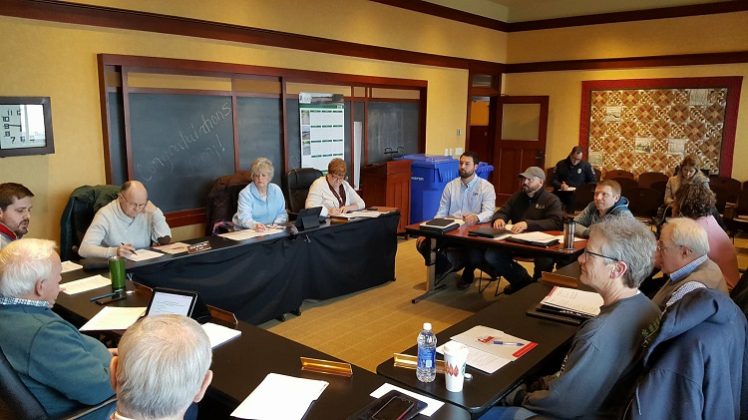
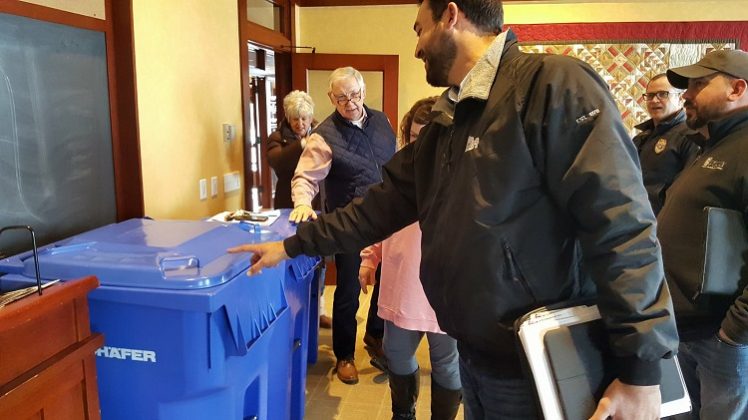
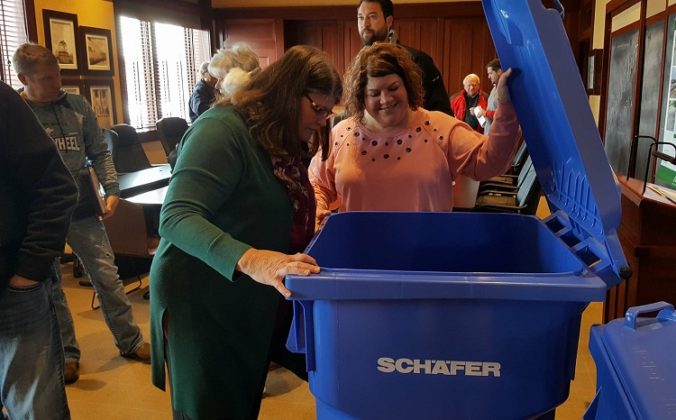
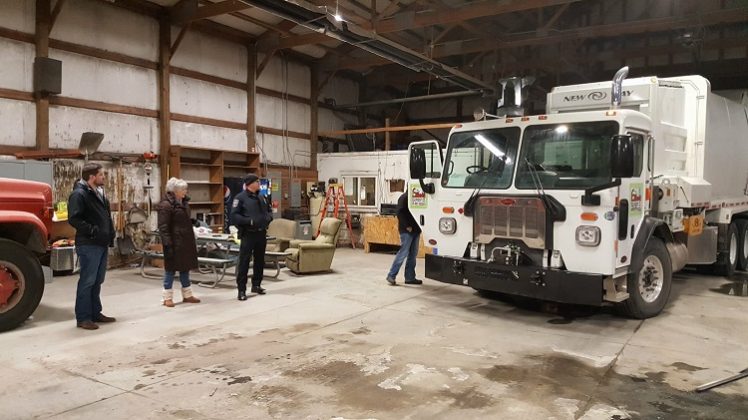








I don’t care for the recycling plan. I bet a lot of people stop recycling all together because it’s not convenient, which of course is bad for the earth. I don’t know. I just don’t see it going well. I like the bin idea for garbage, though. Helps keeps the animals from tearing it up.
I would appreciate being able to use the bins once again as garbage bags get torn up with roaming animals. I think recycling should stay the way it is. I appreciate it being picked up weekly on my curb.
I’m sorry, but weren’t the changes to garbage collection a handful of years ago made so that the city wouldn’t have to go to automated collections?
In general, ThePerryNews.com only approves comments by readers who give their full names and valid email addresses. We make an exception here because your comment seems relevant, and we thank you for reading ThePerryNews.com. We hope you will comply with our policy in future comments.